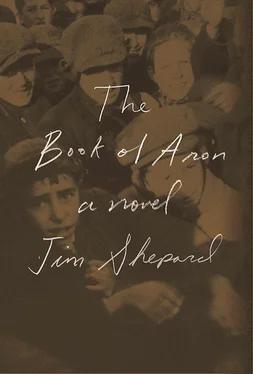At the front door an SS man held a clipboard and took a roll call that took several minutes. The kids packed in tighter on Korczak. The SS man called out the door when he was finished that a hundred and ninety-two children and ten adults were accounted for. Korczak told the staff to spread themselves out and take every fifth row of four but Dora and Balbina had trouble finding their spots. Dora said that all her life she’d had to be first and just this once wanted to take her place farther back. Balbina said she’d never seen anything like it in her entire life and this was the first time she’d ever gone on a trip without knowing where she was going. They were still arguing when he led us out into the sunlight.
It was hot. The sidewalks were so full that we had to walk in the street. Madame Stefa asked why this was and Korczak told her everyone was now required to stand in front of their homes when such operations were taking place.
It was a gigantic procession, a rag parade, everyone staggering and squinting in the daylight, most carrying spoons and bowls. Some of the kids were cheered just to be walking all together.
The sky was hazy. We were the only ones making noise, with our feet. Everyone watching was quiet. We went up Sosnowa, Śliska, and Komitetowa. After a few blocks people called, “Stay well!” or said goodbye to particular kids by name.
All the shoes on the cobblestones made a clopping sound. There was a lot of dust. When we turned up Twarda the sun was in our eyes. Dora started singing “Though the Storm Howls Around Us” and held up her hand to block the sun while she sang. She didn’t have a very strong voice.
She went on alone for half a block before Madame Stefa and Balbina and the rest of the staff and finally Korczak and the kids joined in. I started singing my younger brother’s name.
“Those aren’t the words,” Zygmuś told me.
“What do you care,” I said. One of the Germans escorting the procession pretended to sing along.
The song stopped at Grzybowska Square when we saw all the others. We took a rest while the Germans tried to organize everyone. Korczak put Romcia down. People in the square looked as shocked to see him as he was to see them. We stood with a big group of older girls from the School of Nursing who were all dressed in their uniforms. Korczak told the woman leading them that he’d managed to secure a special wagon for his children.
When they got us moving again at the intersection it was like two floods merging. As the crowd got bigger people had to work harder to stay in their groups. We took over the sidewalks and the Jews looking on had to retreat into doorways or courtyards or else get carried along. Almost everyone was carrying sacks and suitcases or dragging bundles, knocking into the kids and mixing into our lines. Zygmuś got pushed down a side street covered with abandoned bags and luggage and had to fight his way back into the procession. People shouted they’d forgotten their ration cards and had to go back or asked if there’d be water up ahead and if the yellow police had gone deaf.
At Krochmalna an SS man with a cap shaped like a horse’s saddle watched us go by. Gieńa took my hand and told me she’d hidden some bread in her bag.
At Chłodna Street there was another slowdown because kids fell going up the steps. The boards on the top of the bridge bent and creaked under everyone’s weight. Somewhere outside the wall an Aryan trolley clanged its bell. I could see our gang’s old gate. Jerzyk waved his flag when he got to the top of the bridge. He spat down at the street below.
We kept walking. We’d been walking since seven. We were all walking and swaying, walking and swaying, walking and swaying. The sun was now straight overhead. My ears were ringing. Kids stumbled and fell into one another. How were they doing this with no food or water? I felt like I was flooding with something inside.
We stopped twice on Zamenhofa. Every so often someone called Korczak’s name in surprise. The twine on my shoes came undone and I stepped out of them. Some kids had to be pulled off the pavement when we started moving again. They cried they were thirsty or wanted to rest or needed to go to the bathroom. Korczak was still in the front and still carrying someone. We passed my old apartment and I saw my house. I saw my window. Boris stood with his arms folded at the front door, next to his mother.
The gate where the ghetto ended opened well before we got there. Germans and Ukrainians stood in lines on either side of it with clubs and guns and dogs.
Everyone was shoved through and funneled across trolley tracks that opened onto a dirt field by a railway siding. Barbed wire wrapped around a cement post tore my sleeve. Jews already there were weeping and sitting and standing in the hot sun. Clothes and soup spoons and toys and throw-up were spilled around us. People shouted and hugged when they found someone. Some sat in circles facing one another and others wandered around spattered with blood.
Korczak led us to the far end and sat the smallest kids against the wall for shade. He got some men to move to make room.
He sat with the boys and Madame Stefa with the girls. One of the boys asked what would happen next and I heard him say, “Now we’re going on a trip to the forest.” A yellow policeman took the flag from Jerzyk and tossed it over the wall. Ukrainians came by saying that whoever had good boots should give them up since they’d be taken later anyway.
Mietek was still holding my shirttail. The German Witossek stood over us and reintroduced himself to Korczak. His uniform was soaked with sweat even through the empty sleeve that was pinned up and he said that wool was unsuitable for this kind of heat. He took off his cap and wiped his forehead with his sleeve and Korczak turned his attention to the children.
Witossek apologized for the necessity of what had to happen and said he hoped Korczak understood the necessity was one thing and the people who had to carry it out were another. He said he wanted the good doctor to know that what was going to happen was going to happen and that how everyone chose to face it would be the point.
“I agree with you,” Korczak said.
I heard someone singing a song about the king of Siberia. “Pisher!” I shouted. “Pisher!” I stood up and looked around.
The Ukrainians and the yellow police began loading those closest onto the train cars. People were screaming as they were pulled to their feet. Germans lounged against the wall and watched. Some teased the kids nearby. Witossek put his cap back on and walked over to join them.
The Ukrainians and the yellow police kicked and pushed everyone they could into the open doorways. The Ukrainians used their rifle butts as well. Arms and hands stretched out the little window through the barbed wire. When it looked like there was no more room in a car a German walked over with his pistol and fired into the crowd and everyone near who was shot fell backwards and another six or seven people were shoved into the space.
The train was filled and the doors banged shut and the Jews inside screamed until it left. Dust hung in the air from where the ramps had been kicked down.
Korczak put his hands on Abrasha’s shoulders and told him something and other boys leaned in to listen. Madame Stefa put her arms around two girls. A Ukrainian bent over Gieńa and fingered her beads as she sat there with her hands in her lap.
The yellow police gathered around a white enamel pail and took turns cooling off with ladles of water, some pouring it over their heads. Lejkin took the ladle and I put Mietek’s hand on Zygmuś’s shirttail and worked my way over to him.
“Look who’s here,” Lejkin said.
“I know where all the smugglers’ holes are,” I told him.
Читать дальше












